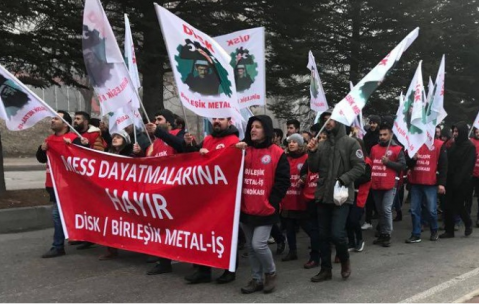In a victory for labor union rights in Turkey, the Constitutional Court on July 2 ruled that a ban imposed by the government on the metal workers’ strike in January 2015 was unconstitutional. It also ordered the government to pay 50,000 Turkish Lira (9,844 dollars) as compensation to the Birlesik Metal-Is (United Metalworkers’ Union), which organized the strike.
The decision to call for a strike was taken after a general assembly meeting on January 10, 2015. Earlier, the Metal Employers’ Association (MESS), representing employers in the sector, had refused to concede the demands of the union.
The first demand had to do with wages. In the metal sector, which employs almost 1.5 million workers and includes 25 of the 50 largest companies in the country, wages are not paid on the basis of equal pay for equal work. A new employee was earning just above the minimum wage. The union had also sought an average wage hike of 9.78%.
The period of the validity of the wage agreement was another factor. The law allows for such an agreement to be signed for any period between one and three years. For three decades before January 2015, the agreement was always signed for two years. However, that year, MESS insisted on it being valid for three years.
Once signed, the unions are bound by the agreement. Given the financial instability that Turkey was subjected to – partly due to the role of international finance and partly due to the domestic political situation – Birlesik Metal-Is refused to be bound for a period of three years, in the course of which much could change in the financial situation of the workers.
The taxation system in Turkey is such that the net earning of workers is higher in the beginning of the year, before tapering due to higher taxation by the end of the year, offsetting by the year-end any benefit the worker might have accrued by increase in wages. Workers represented by Birlesik Metal-Is requested their employers to compensate them for this loss, apart from demanding a reduction of weekly working hours from 45 to 37.5.
After MESS refused to concede these demands, Birleşik Metal-Is refused to sign the collective agreement in December, while two other trade unions in the metal sector – Turk Metal and Celik-Is – which together represent about 65,000 workers in the sector – agreed to MESS’ conditions. In a sector with an overall unionization rate of 16%, Birlesik Metal-Iş represents about 85,000 workers, after consultation with whom, a call for strike was given on January 10.
On January 29, workers at the Cengiz Makine factory in Gebze struck work and shut off power, which was then followed by similar actions in a number of other factories. Workers organized by Birlesik Metal-Is in 22 factories in nine different provinces of the country struck work on that day. More workers from 18 other companies were expected to join the strike by February 19. It was expected over 15,000 workers in 42 factories would be participating.
However, the industrial action was cut short the very next day, when President Recep Tayyip Erdogan and his cabinet members signed an order published in the official gazette, reading, “The strike by Birlesik Metal-Is in the workplaces listed has been considered to be damaging national security and hence has been delayed for 60 days.”
The power to thus suspend lawfully organized strikes on the grounds of “national security”, without providing any explanation on how the strike threatened it, was accorded to the cabinet after the 1980 military coup – a power which successive Turkish governments have held on to.
While “delayed” is the word used in the official decree, it is in fact a suspension because, as per article 63 of the legislative act of 6356 which accords on the cabinet this power, “if an agreement is not reached before the expiry date of the suspension period, the High Board of Arbitration settles the dispute upon the application of either party within six working days. Otherwise, the competence of the workers’ trade union shall be void”. This leaves little or no scope to resume the strike after 60 days of suspension.
This power vested in the cabinet by the military government has been systematically used by the Turkish state to suppress strikes in various sectors. On June 20, 2014, almost 6,000 workers from 10 companies of the biggest glass-making Turkish multinational, Seisecam Group struck work. On the 27th of that month, the Turkish government government issued a decree, again “delaying” the strike by 60 days on the grounds of national security and public health.
Kristal Is, the union which had organized these workers, wrote a complaint to the Director-General of ILO, stating, that the law “has been misused systematically by the Government of Turkey to undermine the freedom of association and the right to strike that are protected by the ILO Conventions. Article 63 and practices of Turkish Government violate ILO Conventions Nos. 87 and 98, both of which have been ratified by Turkey.”
In a previous case filed against the Turkish government in 2003, ILO had said, “The Committee deplores the fact that strikes have been suspended and compulsory arbitration imposed in numerous cases, and requests the Government to ensure in the future that such restrictions may only be imposed in cases of essential services in the strict sense of the term, public servants exercising authority in the name of the State or an acute national crisis.”





